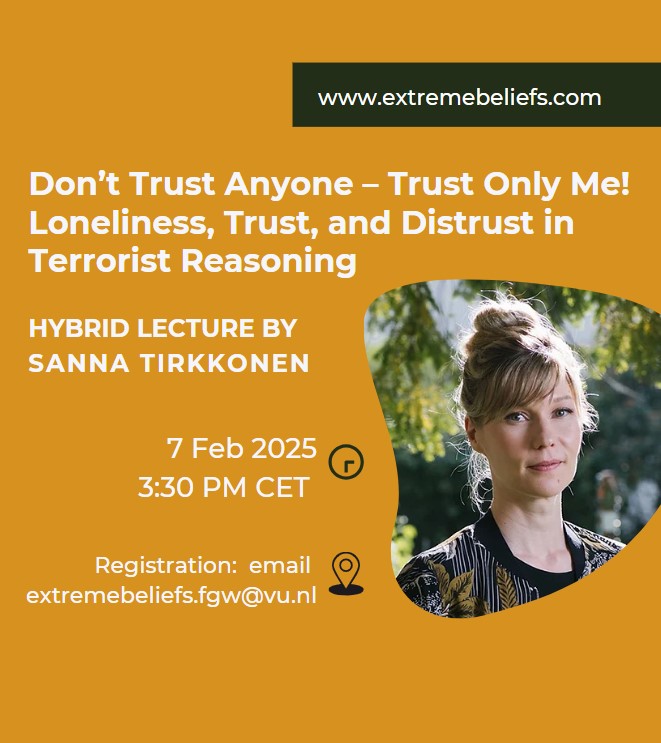
« Go back to: Events
Lecture “Don’t Trust Anyone – Trust Only Me! Loneliness, Trust, and Distrust in Terrorist Reasoning” by Sanna Tirkkonen
Datum evenement: 7 February 2025
Locatie: Hybrid: Vrije Universiteit Amsterdam and Zoom
Locatie: Hybrid: Vrije Universiteit Amsterdam and Zoom

Description
When: 7 February 2025, 3.30 p.m.
Registration: send an e-mail to extremebeliefs.fgw@vu.nl, to receive the location and/or zoomlink.
Registration: send an e-mail to extremebeliefs.fgw@vu.nl, to receive the location and/or zoomlink.
Lecture by Sanna Tirkkonen.
Don’t Trust Anyone – Trust Only Me! Loneliness, Trust, and Distrust in Terrorist Reasoning
Philosophers of trust, such as Annette Baier (1986) and Karen Jones (2019), have suggested that terrorists offer crucial insights into the nature of trust. They argue that terrorists, in their attempts to maximize the impact of their attacks, are adept at identifying and exploiting societal forms of trust. Similarly, in “Terrorism and Trust” (2009), Geoffrey Hosking describes terrorism as stemming from extreme distrust—an acute suspicion or fear that others aim to destroy one’s existence or everything that makes life meaningful. He further argues that terrorism destabilizes societies by eroding trust, creating a climate in which people can no longer rely on the safety of their everyday environments and become suspicious of others.
Despite these insights, the role of trust in terrorist reasoning remains underexplored in the philosophical literature. This presentation addresses this gap by examining the forms of trust and distrust in the manifesto of lone-actor terrorist Anders Behring Breivik. Breivik’s writings reveal a central critique of social trust, particularly in the high levels of interpersonal trust characteristic of Nordic societies. Paradoxically, while inciting widespread distrust, Breivik promises interpersonal trust among his followers, suggesting that it will shield them from loneliness. Importantly, his manifesto aims to foster a broader climate of distrust on the societal level by undermining people’s trust in their social worlds, perceived reality, and institutions.
This analysis raises several philosophical questions: How should we understand these concepts of trust and distrust in the first place? How should an affective climate be conceptualized in this context—and how do they generate social change? Finally, how are loneliness and a lack of trust intertwined within the mindset of a terrorist? These questions will be explored through a close reading of Breivik’s manifesto and the broader philosophical literature on trust.